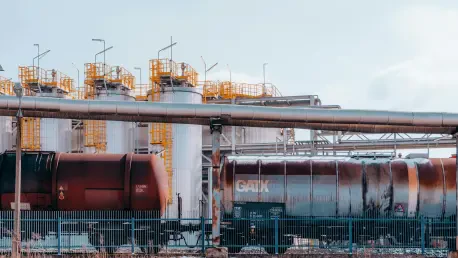The intricate web of geopolitical tensions and financial disagreements continues to choke the flow of oil from Iraq’s semi-autonomous Kurdistan region, a critical artery for global energy markets that has been severely impacted since the shutdown in March 2023. Since that pivotal moment, the Kirkuk-Ceyhan pipeline, which channels oil to Turkey, has remained dormant, halting exports of roughly 230,000 barrels per day (bpd). This paralysis stems from a multifaceted dispute involving Iraq’s federal government, the Kurdistan Regional Government (KRG), and international oil companies. At the heart of the impasse are unpaid debts and the urgent need for guarantees, casting a shadow over a proposed interim deal that could potentially revive operations. As negotiations drag on, the economic stakes for the Kurdish region and Iraq’s broader oil output loom large, underscoring the delicate balance between regional autonomy and international partnerships in a volatile market.
Challenges in Resuming Pipeline Operations
Financial Hurdles and Debt Concerns
The financial strain on oil producers in the Kurdistan region remains a formidable barrier to restarting exports through the Kirkuk-Ceyhan pipeline. A significant sticking point is the accumulated arrears owed by the KRG to international companies, with estimates suggesting a total debt of around $1 billion. Norway’s DNO, the largest producer in the region, claims a share of approximately $300 million in overdue receivables, a figure that underscores the scale of the challenge. Both DNO and UK-based Genel have refrained from endorsing the interim agreement, insisting on concrete assurances for debt repayment before resuming operations. Their reluctance highlights a broader concern among producers about the financial viability of exporting without a clear mechanism to recover past dues, a situation compounded by the region’s economic dependence on oil revenues. This deadlock not only affects the companies involved but also delays the restoration of a vital income stream for the KRG, which is already grappling with fiscal constraints.
Legal and Geopolitical Complexities
Adding another layer of difficulty to the stalled exports is the legal dispute that initially triggered the pipeline’s closure. The International Chamber of Commerce previously ordered Turkey to pay Iraq $1.5 billion in damages for unauthorized exports facilitated by the KRG, a ruling Turkey is currently appealing. Despite signals from Turkey indicating readiness to reopen the pipeline, the unresolved legal battle creates a backdrop of uncertainty that complicates negotiations. Furthermore, Iraq’s position within OPEC+ adds pressure, as the country often exceeds production quotas and faces mandated cuts through mid-2026 to offset prior overproduction. This context places additional scrutiny on the federal government’s efforts to balance national oil output with regional interests. The interplay of these geopolitical and legal factors reveals the intricate challenges of aligning diverse stakeholders, each with distinct priorities, in a region where oil is both an economic lifeline and a source of contention.
Proposed Solutions and Market Implications
Structure of the Interim Agreement
A glimmer of hope emerges from a proposed interim deal designed to break the deadlock over Kurdish oil exports. Under this framework, the KRG would supply at least 230,000 bpd to Iraq’s state oil marketer, SOMO, while retaining 50,000 bpd for local consumption. Sales would be conducted by an independent trader at Turkey’s Ceyhan port, adhering to SOMO’s official pricing structure. A key component of the arrangement involves allocating $16 per barrel to an escrow account for proportional distribution to producers, with the remaining revenue directed to SOMO. This structure aims to ensure transparency and fairness in revenue sharing, addressing some of the financial concerns that have stalled progress. However, the absence of commitment from major players like DNO and Genel, who have suggested minor adjustments to the deal, indicates that the agreement’s success hinges on resolving lingering doubts about debt repayment mechanisms and long-term financial stability for producers.
Market Reactions and Future Outlook
The broader implications of the stalled deal have not gone unnoticed in global oil markets, where even slight shifts in supply can influence price dynamics. Reports of the ongoing deadlock have contributed to a modest uptick in oil prices, countering earlier fears of oversupply that had dampened market sentiment. This reaction reflects the significance of Kurdish oil within Iraq’s total output, which stands at approximately 3.4 million bpd from southern ports alone. The potential resumption of exports from the north could provide a much-needed boost to Iraq’s economy while stabilizing regional markets. Yet, the uncertainty surrounding the participation of key producers casts a shadow over immediate prospects. Looking ahead, the focus must shift toward crafting a sustainable resolution that balances the economic imperatives of the KRG with the financial security of international partners. As negotiations persist, the commitment to finding common ground offers cautious optimism that a breakthrough might eventually emerge from these complex discussions.









